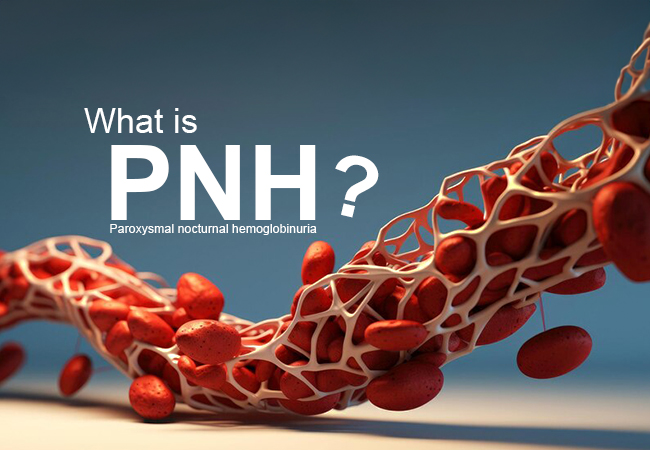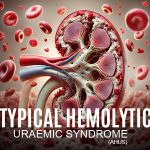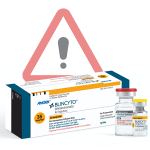Paroxysmal nocturnal hemoglobinuria (PNH) is a very rare blood disorder where defective red blood cells break apart in the bloodstream. This causes symptoms like fatigue, headaches, and trouble breathing. PNH occurs because of a genetic mutation that causes the body to create abnormal blood cells. It develops after birth and is not passed from parents to children.
Doctors diagnose PNH on behalf of symptoms and specific blood tests. These tests help detect abnormal red blood cells (RBCs) and other signs of red blood cell destruction. While treatment has increased life expectancy for individuals with PNH, complications like blood clots can still occur.
PNH got its name from old observations of discolored urine (hemoglobinuria), often seen in the morning. The term “paroxysmal” refers to episodes, and “nocturnal” means occurring at night. However, not all with PNH have dark urine.
Symptoms of PNH:
Symptoms of PNH vary from person to person. Most symptoms are caused by hemolysis, the destruction of red blood cells. These symptoms can range from mild to severe.
Common Symptoms:
- fatigue
- shortness of breath
- rapid heartbeat
- headaches
- chest pain
- back pain
- difficulty breathing during physical activity
Severe Symptoms:
- extreme fatigue
- painful swallowing
- stomach or esophageal spasms
- erectile dysfunction in men
Symptoms may worsen during stress, infections, or traumatic events.
Blood Clot Symptoms:
- headaches
- trouble thinking
- difficulty breathing
- heart palpitations
- sharp abdominal pain
- feeling bloated
Causes of PNH:
PNH arises because of a mutation in a gene called PIGA. This mutation develops in stem cells in the bone marrow, which produce red and white blood cells and platelets. The mutation causes these cells to lack protective proteins, which makes red blood cells (RBCs) vulnerable to destruction by the immune system.
This genetic mutation is not inherited and typically occurs in adults. It may occur in those with weakened bone marrow, often linked to conditions like aplastic anemia. As the abnormal stem cells multiply, they create defective red blood cells, leading to symptoms of PNH.
How PNH Is Diagnosed:
Doctors diagnose PNH using blood tests to check for red blood cell destruction and identify abnormal red blood cells. Some common tests include:
- Complete Blood Count (CBC): It measures levels of red and white blood cells, hemoglobin, and platelets.
- Basic Metabolic Panel (BMP): It checks kidney function and certain other processes in the body.
- Urine Tests: This test helps detect hemoglobin or iron in the urine.
- Reticulocyte Count: It measures immature red blood cells to see if the body is making enough healthy cells.
- Haptoglobin: Low levels indicate red blood cell destruction.
- Lactate Dehydrogenase (LDH): High levels suggest increased red blood cell destruction.
- Sucrose Hemolysis Test: This checks the fragility of red blood cells in a sugar solution.
- Ham Test: This assesses red blood cells’ reaction to acidic conditions.
The most reliable test for diagnosing PNH is flow cytometry, which identifies abnormal red blood cells using a specialized machine.
Complications of PNH:
If not treated, Paroxysmal nocturnal hemoglobinuria (PNH) can lead to serious complications:
- Anemia: Insufficient red blood cells lead to fatigue, shortness of breath, and pale skin.
- Blood Clots: These can block blood flow to vital organs, causing pain, organ damage, or life-threatening conditions.
- Budd-Chiari Syndrome: Blood clots in the liver’s veins can cause upper abdominal pain and fluid buildup.
- Chronic Kidney Disease: Ongoing damage to the kidneys from removing hemoglobin in the blood can lead to kidney problems.
Soliris- An Effective Treatment Option for PNH:
PNH treatment focuses on managing symptoms, preventing complications, and addressing the disease directly. There are two main approaches: treating the disease itself and addressing specific problems like anemia or blood clots.
Eculizumab (Soliris) is an FDA-approved monoclonal antibody that is designed to work to reduce the destruction of red blood cells in people with paroxysmal nocturnal hemoglobinuria (PNH). It was the first medicine approved to reduce the destruction of red blood cell (RBC), a process known as hemolysis, in patients with PNH.
The intravenous (into-the-vein) therapy, supplied in Injection: 300 mg/30 mL (10 mg/mL) in a single-dose vial. It was developed by Alexion Pharmaceuticals, which was acquired in 2021 by AstraZeneca (AZ)— has demonstrated evidence that it can help prevent blood clotting and reduce the requirement for red blood cell (RBC) transfusions in PNH patients.
Soliris also is approved by the US FDA for the treatment of patients with myasthenia gravis (MG), atypical hemolytic uremic syndrome (aHUS), and neuromyelitis optica spectrum disorder (NMOSD).
Some Soliris biosimilars are available. Biosimilars are products that contain a version of the same active ingredient that’s functionally equivalent to the reference biological product they are based on. Bkemv (eculizumab-aeeb), the first interchangeable biosimilar of Soliris to become available in the U.S., was approved in 2024 by the FDA to treat PNH and aHUS. Sold by Amgen, Bkemv is also available in Europe for the treatment of PNH, where it is marketed as Bekemv.
Other Approved Drug Therapies:
These therapeutic drugs target the immune system to help prevent the destruction of red blood cell (RBC):
- Ravulizumab (Ultomiris): Similar to eculizumab but given every eight weeks.
- Pegcetacoplan (Empaveli): A newer drug that works differently to stop red blood cell destruction.
Supportive Treatments:
- Folic Acid: This helps replenish the body’s supply of red blood cell (RBC) production.
- Iron Supplements: These supplements replace iron lost because of red blood cell destruction.
- Steroids: These may temporarily reduce hemolysis but have limited effectiveness and side effects.
- Anticoagulants: These may help prevent blood clots but carry a bleeding risk.
- Thrombolytics: these may break up existing clots but are used cautiously due to potential complications.
Living with PNH:
With modern treatments, individuals with PNH can live normal life spans. However, precautions are necessary to prevent complications like blood clots, especially before surgeries or during long flights.
Pregnancy and PNH:
Pregnancy poses higher risks for individuals with PNH, including blood clots and premature delivery. Women with PNH should consult healthcare specialists before planning a pregnancy.
Prevention of PNH:
PNH cannot be prevented since it results from a random genetic mutation. However, early diagnosis and effective treatment can help prevent serious complications and improve quality of life (QoL).
Research and Statistics on PNH:
PNH is rare condition that affect between 1 and 5 people per million worldwide. It affects both men and women equally. According to some studies, there is lightly higher prevalence of this disease in East and Southeast Asian populations because of the increased risk of bone marrow disorders in these regions.
Ongoing research aims to uncover why abnormal stem cells in PNH multiply so quickly and how new treatments can improve outcomes for people with the condition.
Where can I find Soliris in India?
Soliris is available in India through licensed importers like Indian Pharma Network. We ensure safe and reliable access to this life-saving medicine across major cities such as New Delhi, Mumbai, Bengaluru, Gurgaon, and Chennai.
How can I access Soliris in Lucknow, Delhi, and Noida?
Patients in cities like Lucknow, New Delhi, Noida, Kolkata, Hyderabad, Pune, Bengaluru, and Chennai can buy Soliris through Indian Pharma Network. We help patients source this rare medicine efficiently and legally.
Can I buy Soliris online in India?
Yes, you can buy Soliris online in India through Indian Pharma Network. They provide expert support and ensure safe delivery of the medicine while complying with legal and regulatory requirements.
Who is the Soliris importer in India?
Indian Pharma Network (IPN) is a trusted importer of Soliris in India. We specialize in sourcing rare and difficult-to-find medicines and delivering them to patients across India and other countries.
Is Soliris available in SAARC countries?
Yes, Soliris is accessible in SAARC countries, including India, Nepal, Bhutan, Bangladesh, Sri Lanka, Maldives, Pakistan, and Afghanistan. Indian Pharma Network (IPN) facilitates the supply of Soliris to these regions. We provide timely access of hard-to-find medicines including Soliris for patients.






